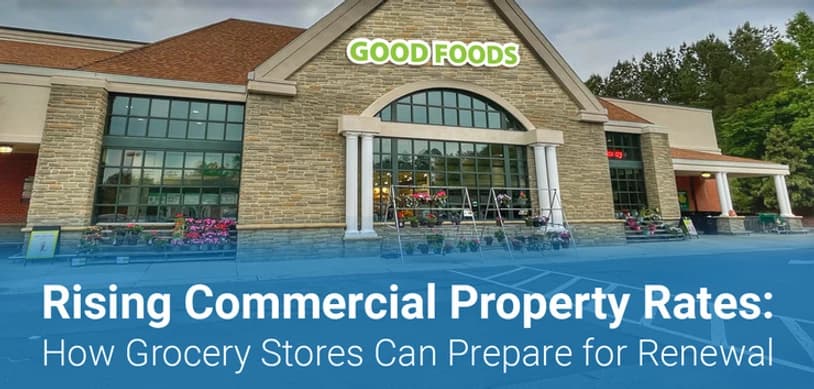Since the pandemic began, grocery stores have been challenged to keep up with consumer demand while managing worker and inventory shortages. Now, there’s another challenge: rising property insurance rates.
For the fifth consecutive year, property insurance rates have risen. Most recently in the fourth quarter of 2021, property insurance rates increased 8.3% according to Market Scout.
There are three main factors for increasing commercial property rate hikes:
- Natural disasters: Sharp increases in the frequency and severity of losses caused by water, flood and precipitation events.
- Supply-chain issues: Building costs have drastically risen due to a shortage of construction materials and a shortage of available construction workers.
- High inflation: A 7% increase from one year ago represents the highest one-year inflation change in 40 years in the United States.
A combination of these factors, in addition to undervaluation of replacement cost values, has significantly affected property insurance underwriting. These trends have disrupted the accuracy of previous underwriting models causing the need for increased scrutiny.
Increasing commercial property rates have particularly affected the retail segment of the economy. Combined with worker shortages, retailers and grocers are juggling supply-chain issues, inflation and increasing litigation claims.
However, according to First National Realty Partners, the 2022 outlook looks promising for the segment. Spending at grocery stores is expected to rise as a greater emphasis on home-prepared meals continues post-pandemic.
E-commerce sales and online grocery shopping will also continue to help grocery revenues, and these trends may help offset the pain of commercial property rate hikes.
How to Prepare for Your Property Insurance Renewal
Increasing insurance rates can have a significant impact on your business. So, now is the type to start strategizing. What steps can you take to prepare for your renewal?
Partner with an insurance broker who specializes in grocery. This individual can be a difference maker as they understand the nuances and specific risks associated with retail. They can structure your policy to focus coverage on your biggest exposure areas, while helping you trim and stop paying for coverages you will never use.
Work with your broker to audit and address exposures on your property. Be sure that you have loss prevention strategies and procedures documented to mitigate every potential risk. Now is the time to shore up any policies and procedures you’ve let slide. Update employee education and training.
Start the renewal process early. Be prepared to provide your broker and underwriter with thorough documentation. Be transparent about the specific exposures at your property and the controls you’ve put in place to prevent claims.
Invest in preventative maintenance and loss control. This should reduce claims, which in turn can reduce the impact of rate hikes going forward. This includes maintenance of buildings, walkways, signage and parking lots and installing security systems and theft prevention protocols.
Review emergency preparedness plans. Weather events have been a major driver of losses. Underwriters will want to know the steps you’ve taken to be ready for the weather events most likely to affect your structures, inventory and other assets.
Rising commercial property rates are affecting grocery store renewals. Download our new handout, Commercial Property Rates: How Grocery Stores Can Prepare for Renewal to share with your team.
Have questions about your next renewal? We can help! Contact Joe or Melissa today.
| Joe Scarpello | Melissa Johnson |
| 253.444.5584 | 253.444.5654 |
Commercial Property Insurance Rates Commercial Property Insurance Rates


